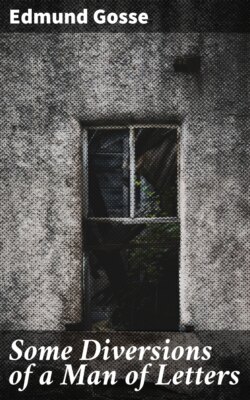Читать книгу Some Diversions of a Man of Letters - Edmund Gosse - Страница 5
На сайте Литреса книга снята с продажи.
THE SONGS OF SHAKESPEARE
ОглавлениеTable of Contents
Among the "co-supremes and stars of love" which form the constellated glory of our greatest poet there is one small splendour which we are apt to overlook in our general survey. But, if we isolate it from other considerations, it is surely no small thing that Shakespeare created and introduced into our literature the Dramatic Song. If with statistical finger we turn the pages of all his plays, we shall discover, not perhaps without surprise, that these contain not fewer than fifty strains of lyrical measure. Some of the fifty, to be sure, are mere star-dust, but others include some of the very jewels of our tongue. They range in form from the sophisticated quatorzains of The Two Gentlemen of Verona (where, however, comes "Who is Silvia?") to the reckless snatches of melody in Hamlet. But all have a character which is Shakespearean, and this regardless of the question so often raised, and so incapable of reply, as to whether some of the wilder ones are Shakespeare's composition or no. Whoever originally may have written such scraps as "They bore him bare-faced on the bier" and "Come o'er the bourne, Bessy, to me," the spirit of Shakespeare now pervades and possesses them.
Our poet was a prodigious innovator in this as in so many other matters. Of course, the idea and practice of musical interludes in plays was not quite novel. In Shakespeare's early youth that remarkable artist in language, John Lyly, had presented songs in several of his plays, and these were notable for what his contemporary, Henry Upchear, called "their labouring beauty." We may notice that Lyly's songs were not printed till long after Shakespeare's death, but doubtless he had listened to them. Peele and Greene had brilliant lyrical gifts, but they did not exercise them in their dramas, nor did Lodge, whose novel of Rosalynde (1590) contains the only two precedent songs which we could willingly add to Shakespeare's juvenile repertory. But while I think it would be rash to deny that the lyrics of Lodge and Lyly had their direct influence on the style of Shakespeare, neither of those admirable precursors conceived the possibility of making the Song an integral part of the development of the drama. This was Shakespeare's invention, and he applied it with a technical adroitness which had never been dreamed of before and was never rivalled after.
This was not apprehended by the early critics of our divine poet, and has never yet, perhaps, received all the attention it deserves. We may find ourselves bewildered if we glance at what the eighteenth-century commentators said, for instance, about the songs in Twelfth Night. They called the adorable rhapsodies of the Clown "absurd" and "unintelligible"; "O Mistress mine" was in their ears "meaningless"; "When that I was" appeared to them "degraded buffoonery." They did not perceive the close and indispensable connection between the Clown's song and the action of the piece, although the poet had been careful to point out that it was a moral song "dulcet in contagion," and too good, except for sarcasm, to be wasted on Sir Andrew and Sir Toby. The critics neglected to note what the Duke says about "Come away, come away, Death," and they prattled in their blindness as to whether this must not really have been sung by Viola, all the while insensible to the poignant dramatic value of it as warbled by the ironic Clown in the presence of the blinded pair. But indeed the whole of Twelfth Night is burdened with melody; behind every garden-door a lute is tinkling, and at each change of scene some unseen hand is overheard touching a harp-string. The lovely, infatuated lyrics arrive, dramatically, to relieve this musical tension at its height.
Rather different, and perhaps still more subtle, is the case of A Winter's Tale, where the musical obsession is less prominent, and where the songs are all delivered from the fantastic lips of Autolycus. Here again the old critics were very wonderful. Dr. Burney puts "When daffodils begin to peer" and "Lawn as white as driven snow" into one bag, and flings it upon the dust-heap, as "two nonsensical songs" sung by "a pickpocket." Dr. Warburton blushed to think that such "nonsense" could be foisted on Shakespeare's text. Strange that those learned men were unable to see, not merely that the rogue-songs are intensely human and pointedly Shakespearean, but that they are an integral part of the drama. They complete the revelation of the complex temperament of Autolycus, with his passion for flowers and millinery, his hysterical balancing between laughter and tears, his impish mendacity, his sudden sentimentality, like the Clown's
